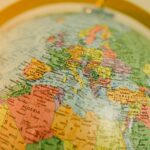A Bedouin Perspective
By The Bedouin Report
In a world saturated with information, the role of ethical journalism has never been more vital, especially when it comes to the Middle East, North Africa, and the greater Sahel Region. The MENA region is no stranger to misrepresentation. Its history, politics, and people have often been cast through distorted lenses, shaped not by truth or context but by the convenience of a foreign narrative or the agenda of a distant newsroom. In such a climate, it is not merely important, but necessary, to revisit what ethical journalism truly means, and why it matters now more than ever when reporting on the MENA region.
The problem begins with the fundamental question of perspective. Too often, reports on MENA are written not for the people of the region, but for foreign consumption, filtered through a prism of geopolitical interest, religious bias, or orientalist fascination. The result is a caricature, not a portrait. It is why uprisings are reduced to clichés of chaos, why nations with millennia of civilization are flattened into “hotbeds” or “powder kegs,” and why leaders are either demonized or lionized with no room for nuance. When the audience is imagined to be exclusively Western, ethics falter, and accuracy is replaced by sensationalism.
An ethical approach demands more than factual correctness. It demands fairness. It requires asking not only what happened, but why it happened, who benefits from the framing, and whose voices are absent. It recognizes that no story exists in a vacuum and that every headline carries the weight of interpretation. The way a conflict is described, the words chosen to characterize a movement, or the background omitted from a policy debate, all of these are editorial decisions with real-world consequences. In the MENA region, where global interests intersect with local aspirations, such decisions shape international perceptions, domestic stability, and even policy outcomes.
Moreover, ethical reporting cannot be detached from historical context. One cannot cover Gaza without understanding its blockade. One cannot write about Syria without recalling colonial mandates and foreign interventions. And one cannot analyze North African migration without addressing the legacies of European occupation and economic extraction. Yet so many reports float above history, as if the region were unanchored from its past, its people presented as reactive rather than reasoning, as perpetual recipients of crisis rather than agents of change.
In matters of intelligence, politics, and military affairs, the stakes are even higher. When media platforms uncritically echo claims from unnamed “officials” or rely on opaque think tanks with political ties, they abandon their ethical responsibility. Intelligence leaks, diplomatic whispers, and defense narratives must be verified, contextualized, and scrutinized. Otherwise, journalism becomes a tool of propaganda, disinformation by omission or implication.
Ethical journalism must also recognize that analysis is not the same as advocacy. Political commentary must be grounded in clarity, transparency, and a respect for the reader’s right to form their own opinion. Analysts writing about MENA affairs must declare their positions when relevant, avoid false equivalencies, and resist the temptation to flatten complexity into soundbites. A region as diverse and dynamic as MENA deserves analysis that is neither patronizing nor performative, but thoughtful, rigorous, and rooted in local understanding.
Ethical reporting is not an isolated standard exclusive to journalism, in news intelligence and geopolitical analysis. It mirrors the same principles we demand in finance, law, and governance. Consider the financial collapse of 2008, a global crisis rooted in deceitful accounting, manipulated risk assessments, and a systemic failure to uphold ethical transparency. In response, legislation like the Sarbanes-Oxley Act was introduced to restore public trust by enforcing truth in financial disclosures. The same moral framework must apply to the media. Just as misleading financial reports can trigger economic devastation, biased or irresponsible journalism, especially in regions like MENA, can fuel conflict, deepen divisions, and distort policy. The consequences of unethical reporting are not abstract; they are human, tangible, and far-reaching. Ethics in journalism, therefore, is not merely a professional guideline. It is a public duty.
The call for ethical reporting of events in the Region merges as a response to the ethical void in how this region is portrayed, analyzed, and understood. To this end, our reporting aims to amplify the collective call for a higher standard of truth. Ethical journalism is more than a principle. It is a commitment to professional deontology and jurisprudence. A commitment to honesty, depth, and humility. Therefore, there is a moral imperative to elevate local voices. Ethical reporting means centering the journalists, thinkers, historians, and citizens of the MENA region itself. It means seeking sources not only in embassies or war rooms, but in local universities, mosques, homes, and local marketplaces. Not elsewhere, in Europe, in the UK, in America. But right here in MENA. Finally, this means, when covering the Middle East, North Africa, the Sahel, resist the instinct to speak and misinform about MENA. Rather, uphold journalistic decency with truth, facts, and evidence, from the locals, the people of the land, the desert dwellers of the region.









More Stories
Sudan v. United Arab Emirates
China-Taiwan Tensions Mount: What Recent Actions Reveal
COVID-19 Updates: What the Latest Data and Vaccines Reveal